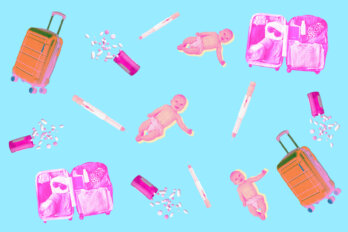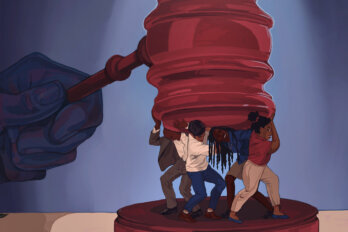One day in the fall of 2003, several leaders from a new advocacy group, Canadians for Equal Marriage (CEM), showed up at the Toronto headquarters of Pink Triangle Press carrying computers and other office supplies. A few months earlier, the Court of Appeal for Ontario had ruled that Canadian laws prohibiting same-sex marriage violated the Charter of Rights and Freedoms, making the province the first in Canada to allow same-sex marriage. CEM had set its sights on the rest of the country.
At Pink Triangle Press, a publisher devoted to the LGBTQ community, the decision to donate space to CEM caused a flurry of debate. Gay and lesbian couples had been getting married, but in the heart of Toronto’s Gay Village, where hedonism was supposed to rule, there wasn’t much buzz. At the time I was managing editor of the Xtra! chain of newspapers. In our offices, the same-sex marriage victory was treated as a marginal development, a meagre success of neoliberals and their lawyers. I found myself jumping into all sorts of heated debates. Weren’t the shackles of marriage—its oppression of women, its stifling mandate of monogamy, its failure to recognize the capriciousness of desire—exactly what the movement was fighting against? Our lives were different—why would we want to emulate straight people? Wasn’t this a waste of community resources when police were still arresting people for having sex in bathhouses (and in parks and parking lots)? Didn’t it make us look like hypocrites?
Pink Triangle Press had been Canada’s most vocal champion of the gay liberationist agenda, a parallel movement to the equality-and-rights LGBTQ activism. Gay liberation had emerged out of a broader 1960s sexual radicalism, proposing that mainstream culture placed unreasonable and artificial limitations on sexuality, particularly homosexuality. Just as feminism calls for women to shrug off the patriarchy and take control of their own fates, gay liberation called for gay men and lesbians to follow their sexual desires without shame. Activists wanted to upend the idea of family and marriage, to sever the assumed connection between sex and love. Straight people might have affairs and kinky sex, but gay promiscuity could build a new queer nation. So when the marriage advocates showed up to start lobbying the federal government to legalize same-sex marriage nationally, the reception was not especially warm.
Thirteen years later, the activists and lawyers who focused on equality and rights are seen as true heroes. Same-sex marriage is the law of the land, and governments across Canada have eliminated or are moving to eliminate almost all legal discrimination against gay and lesbian people, and more recently, trans people. Prime Minister Justin Trudeau, who this month appointed Randy Boissonnault as special advisor on LGBTQ issues, has suggested the government will apologize to all Canadians who have been persecuted because of their sexuality.
Gay liberation had promised a sexual utopia, an Oz where conventional social judgements did not apply. But that was a dead end. It was only by taking sex off the table did gay and lesbian people make any real socio-political headway in this country.
Being a gay Canadian living through the late twentieth and early twenty-first century was to experience one’s very existence vindicated. Not only officially, but also in the hearts and minds of a majority of the population. Everything you were told about yourself—that you were mentally ill, criminal, perverted, non-existent, incapable of love, untrustworthy, dangerous—was completely reversed.
No other group has had that kind of success, not the anti-racist movement, not feminism, not Aboriginal people, and not Quebec separatists. Yet Canada’s original gay liberation movement has now been pushed aside as a historic footnote to the equality-focused LGBTQ activism that ate it up and spit it out. Events this year celebrating the forty-fifth anniversary of The Body Politic, the influential gay liberationist magazine published by Pink Triangle Press prior to Xtra!, felt more like an exercise in nostalgia than the affirmation of a relevant social force.
A celebration of unbound sexuality, the gay liberation movement’s obsession with the extremes of sexual behaviour often drove away moderates: those who didn’t want to give up their ideas of romantic love, people who were attached to everything about their religion except prohibitions on same-sex relationships, and trans people who cared more about recognition of their identity and improving health services than bedding as many partners as possible.
Lesbians and bisexual women, too, tended to be less interested in the sexual adventures offered by the liberation movement; many were raising children together and yearned for more family stability, not more free love. The WASPy whiteness of the movement’s founders, perhaps understandable in the early years, also prevented it from making a deeper impact in multicultural Canada, even though new Canadians, often coming from homophobic countries, are most in need of support and inclusion.
Operating between 1971 and 1987, The Body Politic, in particular, was often seen as reflecting the interests of a particular sort of gay white man rather than a broader community of sexual minorities. One of its biggest internal controversies was in 1985, over a personal ad for “a young well built BM [Black Man] for houseboy.” Though some collective members saw the ad as racist, objectifying readers of colour, others argued that any expression of desire is legitimate. “Sexual desire is just there . . . it is not there to be morally evaluated and either glorified or condemned,” wrote collective member Ken Popert, who still runs Pink Triangle Press. “Desire is inviolable.”
The Body Politic’s most famous controversy, though, was over a 1977 article called “Men Loving Boys Loving Men,” which spotlighted several adult men who were in relationships with teenaged boys, which included sex. The article triggered a police raid and obscenity charges. The collective eventually won after almost six years before the courts, but the case bothered some in the community who thought the exploration of man-boy love amounted to advocacy and that it perpetuated the belief that gay people were more likely to be paedophiles than straight people. In a society where the straight majority is, inevitably, at the wheel, people wondered how this anything-goes philosophy could improve the lives of average gay and lesbian people in tangible ways.
At its heart, gay liberation was about being left alone, about being given the space to create one’s own relationships, sexual, fraternal, or otherwise. That idea had great power in the reaction to the bathhouse raids in Montreal and Toronto in the 1970s and ’80s, when police busted into saunas to arrest adult men having consensual sex. There were protests in the streets, demands made. Anger can give a community form and confidence. But as time passed, some thought there needed to be more strategy and persuasion—a more unambiguous approach to systemic discrimination.
Bob Gallagher is a Toronto activist who used to explore the gay sexual underworld with the late French intellectual bad boy Michel Foucault. Now head of communications and political action at the United Steelworkers, Gallagher helped establish Canadians for Equal Marriage in the Pink Triangle Press offices in 2003. He sets the date for the tactical shift from free love to equal rights much earlier than I do—in 1994. That’s when the advocacy group Foundation for Equal Families formed after Ontario failed to pass Bill 167, which would have changed the definition of spouse to treat same-sex couples like opposite-sex common-law couples. The decision on the group’s name was a monumental decision. “Family was synonymous with a heterosexual family, which we were left out of. We had rejected that, to be a single individual with sexual desires, who wanted to be free to engage in those sexual desires,” he says. “But politically, having the ‘right to love’ is much more accessible to someone who isn’t queer.”
While the LGBTQ community has gained much during the fight for equal rights, some proponents of the gay liberation movement think that, as a result, some things have been lost. “A lot of people don’t want to be a part of gay culture. They say, ‘I’m married, I go to church, that’s not my life,’” says Sky Gilbert, activist, playwright and associate professor at the University of Guelph. Gilbert remains devoted to championing alternative relationships, “fucking with gender” and camp, but these days he can seem like a voice in the wilderness. The focus on “equal love” has purged the appealing irrationality of sex. “People are talking about how we’re all the same, but I call it very Pollyanna and very misleading rhetoric,” he says. “I’ve always been a believer that we’re not all the same.”
Perhaps the most radical sexual liberationist beliefs were built on the assumption that the straight world would never change: gay and lesbian people would always be illegal, so had no choice but to develop ideas and strategies for being happy while illegal. When Canadian society proved to be more flexible than expected, many LGBTQ people realized they didn’t want to run off to the big city to be campy creatures of the night. They just wanted to live where they wanted, be accepted by their friends and family, and live their lives as straight people do.
Yet, as Gilbert points out, the “we’re just like you” shtick only goes so far. Male sexuality has always had a reputation for being hard to contain, and so gay male sexuality, unencumbered by the double standards facing women, can still be a point of contention. Just this fall, Toronto police set up a sting operation to arrest men having sex in an Etobicoke park, after years of exercising more discretion toward such behaviour. At the national level, the federal government is debating legislation that will set the age of consent for anal intercourse at sixteen, the same as for other sexual acts. Though the existing law, which prohibits anal sex with those under eighteen, makes no reference to sexual orientation, the law is considered to have been built on the fear of gay men “grooming” teens to turn them gay. (The section also prohibits anal sex when there’s more than two people present.) Both the discussions around the park arrests and the legislative reform reveal ongoing anxieties around the sex lives of gay men. After a couple of decades of gay love, we might finally be ready to talk again about gay sex.





